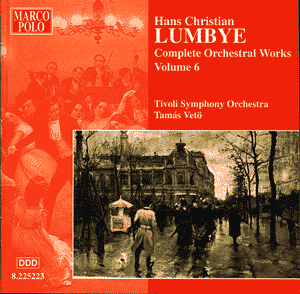This is yet another disc in the Marco Polo Lumbye series
and offers a further selection of waltzes, polkas and galops that were
popular in the heyday of Danish 19th century dances held
at the Tivoli amusement garden ballroom. One lovely piece makes a departure
from the numerous dances on the disc. It is a delightful fantasy tone
poem called Dream of the Warrior.
Hans Christian Lumbye was born in Copenhagen
and from the age of 14 was a military trumpeter. We know that he studied
music in Randers but no qualification is known. In 1839 he was deeply
impressed by a visit of an Austrian band to Copenhagen, playing Strauss
and Lanner. He formed an orchestra and performed their works. Lumbye
was a composer with no particular formal training yet this did not detract
from collaborating with the Danish ballet master Bournonville to provide
dances and ballet music for theatre productions. His fame grew with
the opening of the Tivoli Gardens (1843) where he served as orchestra
director until 1872, two years before his death. He was not a man with
ambition yet was one who brought great pleasure with bright dance tunes
of much variety.
The music here cover a period from 1844 to 1871 and
include dances that may well have found their way from the Tivoli Ballroom
to every corner of Vienna and Austria to compete with those of Johann
Strauss. Today they are rarely played apart from the Vienna New Year
Day’s concert, yet despite this they hold a distinctive brightness and
charm. They display the diversity of imagination that Lumbye reveals
in his compositions.
The 5th of June, March is as rousing
as a Sousa equivalent, written to mark the celebrations surrounding
the birth of a new Danish Constitution when a festival dance was held.
The jaunty and delicate Little Prince Christian
Carl's Waltz is a suite of four waltzes with an opening simplistic
charm added where glockenspiel and flute punctuate the ends of phrases.
Christian Carl became King Christian X of Denmark.
The Dream of the Warrior is a sort of
marching military tone poem. The music is engaging and provides an extremely
pleasant orchestral interlude. The CD notes outline the Warrior story
that gave Lumbye his inspiration.
The Sadness Waltz is anything but: a
suite of gliding waltzes, strongly balletic in style that could have
been written by Tchaikovsky in one of his lighter moments.
In the Tivoli park was a lake with island, on which
‘Greek gods’ were tended by ‘Muses and Graces’. Echo from the
Old Gods at Tivoli Island is a galop that attempts to depict
the atmosphere of the island.
The notes fail to mention that the opening to A
Festive Night at Tivoli is the rousing opening to Zampa overture
(Hérold), rarely heard nowadays. It then moves on to incorporate
Giselle (Adam) and a finale of Offenbach's Orpheus in the Underworld.
Here I would have preferred Lumbye to be referred to more as an arranger
than be inferred as the composer.
The Pomona Waltz is an extended piece
with a softly focused waltz and prominent clarinet figure. Its title
relates to the Roman goddess of gardens, trees and flora. The music
carries elements of birdsong in between the more robust elements of
the waltz.
As with the other discs in this series, the music is
well played under Vetö's direction. The Tivoli Gondola includes
some fine solo violin playing. Orchestral detail is clearly defined
and the Tivoli Concert Hall’s acoustics suit the music. Interesting
background notes by Knud Arne Jürgensen on each of the pieces is
included.
Those who enjoy the atmosphere of the Vienna New Year’s
Day broadcasts will enjoy this volume. The Tivoli orchestra is full
of life and the players obviously enjoyed the recording session. Another
good recording from Marco Polo.
Raymond Walker
.
